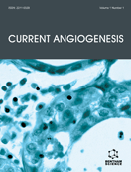Abstract
Background:It has been shown that angiogenesis is an essential component of tumor growth, proliferation and metastasis, with increased angiogenic marker expression correlating with poor prognosis in patients with epithelial ovarian cancer. Interest in anti-angiogenic therapies has evolved, with development of targeted agents against vascular endothelial growth factor (VEFG), platelet derived growth factor (PDGF), and fibroblast growth factor (FGF), as well as novel tyrosine kinase inhibitors (TKIs), and vascular disrupting agents (VDAs). We sought to review the use of anti-angiogenic agents in the treatment of ovarian cancer.
Methods: A PubMed search of articles in the English language discussing the use and efficacy of anti-angiogenic agents in ovarian cancer was performed using the key words: “ ovarian cancer,” “VEGF,” “PDGF,” “FGF,” “TKIs,” and “VDAs” alone or in combination. The search was also guided through a review of the reference lists of identified articles. Lastly, abstracts presented at recent national oncology meetings were queried for applicable papers. Results: The best-studied anti-angiogenic agent to date, bevacizumab, has shown significant improvements in progression free survival (PFS) in patients with advanced stage ovarian cancer in 2 large phase III clinical trials. In addition, inhibitors of parallel pathways that may contribute to tumor growth via angiogenesis, including PDGF and FGF mediated signaling, have shown modest single agent activity in phase II trials. Lastly, novel angiopoietin inhibitors as well as vascular disrupting agents are being investigated for use in patients with ovarian cancer. These agents, as a class, have a unique adverse event profile that is likely attributable to their mode of action. Conclusions: Targeted anti-angiogenic therapies may provide clinic benefit in the treatment of women with primary or recurrent epithelial ovarian cancer. It is unclear if combination therapy will result in greater effect than single agent treatment. Importantly, identification of women most likely to benefit from these novel targeted therapies is an area of great interest, in an effort to improve outcome and control cost.Keywords: Ovarian cancer, targeted therapy, anti-angiogenic agents, tyrosine kinase inhibitors, vascular disrupting agents
 20
20

